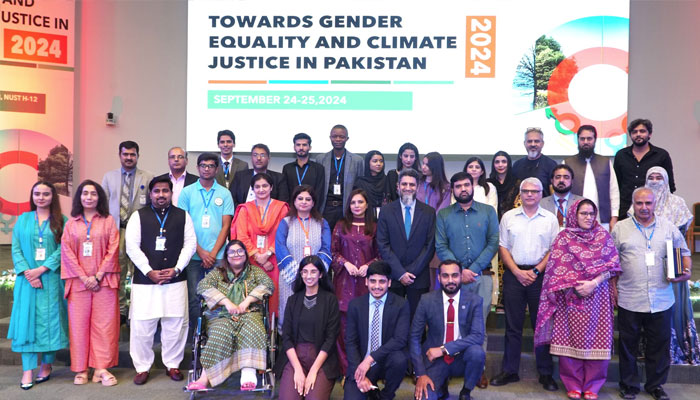Conference on gender, intersectionality and climate change held at NUST
Islamabad:An overwhelming number of academics, policymakers, development workers and activists converged on the National University of Sciences & Technology (NUST) to attend a conference on ‘Gender, Intersectionality & Climate Change: From Scientific Evidence to Action.’
Funded by the German Federal Ministry for Economic Cooperation and Development (BMZ) and supported by the Deutsche Gesellschaft für Internationale Zusammenarbeit (GIZ) GmbH, the conference highlighted the critical need for equitable climate policies that address the unique challenges facing women and marginalised communities. GICC featured panel discussions, case studies, and an interactive exhibition showcasing innovative approaches to gender-responsive climate governance.
The event kick-started with a powerful opening statement by Jan Kühn von Burgsdorff, First Secretary of German Embassy, stressing the importance of gender inclusion in climate policies and Germany's support for Pakistan’s efforts to achieve the desired objectives.
Dr Osman Hasan, Pro-Rector Academics NUST, delivered the closing remarks. He emphasised the need for empowering women and ensuring their equal participation in climate decision-making, which could lead to more effective and equitable solutions in addressing the challenges posed by climate change. Leading experts at the conference highlighted the disproportionate impact of climate change on women and marginalised communities.
Dr Nausheen Hafeeza Anwar, Director & Founder of the Karachi Urban Lab at the Institute of Business Administration (IBA), Karachi, underscored the need for inclusive decision-making in climate governance. Dr Sauleha Kamal from the University of York and Dr Muhammad Sajjad, from the University of Hong Kong, provided important insights into the gendered aspects of climate adaptation and the vulnerability of disaster-prone areas.
Complementing the insightful discussions, the conference featured an art and photo exhibition, showcasing visual representations of how climate change impacts different communities, particularly women. A Project and Product Exhibition, modeled after the concept of a “human library,” allowed attendees to engage with ongoing projects that promoted gender equity in climate action.
-
 Japan: PM Takaichi Flags China ‘Coercion,’ Pledges Defence Security Overhaul
Japan: PM Takaichi Flags China ‘Coercion,’ Pledges Defence Security Overhaul -
 Angorie Rice Spills The Beans On Major Details From Season 2 Of ' The Last Thing He Told Me'
Angorie Rice Spills The Beans On Major Details From Season 2 Of ' The Last Thing He Told Me' -
 Questions Raised Over Andrew Mountbatten-Windsor's Line Of Succession
Questions Raised Over Andrew Mountbatten-Windsor's Line Of Succession -
 'Shameless' Sarah Ferguson 'pressuring' Princess Eugenie, Beatrice For Major Reason
'Shameless' Sarah Ferguson 'pressuring' Princess Eugenie, Beatrice For Major Reason -
 Teacher Arrested After Confessing To Cocaine Use During Classes
Teacher Arrested After Confessing To Cocaine Use During Classes -
 Paul McCartney Talks 'very Emotional' Footage Of Late Wife Linda In New Doc
Paul McCartney Talks 'very Emotional' Footage Of Late Wife Linda In New Doc -
 Princess Beatrice, Princess Eugenie's Response To Andrew's Arrest Revealed
Princess Beatrice, Princess Eugenie's Response To Andrew's Arrest Revealed -
 King Charles And Princess Anne Bestow Honours At Windsor Castle
King Charles And Princess Anne Bestow Honours At Windsor Castle -
 King Charles 'worried' As Buckingham Palace, Royal Family Facing 'biggest Crisis'
King Charles 'worried' As Buckingham Palace, Royal Family Facing 'biggest Crisis' -
 Milo Ventimiglia Recalls First Meeting With Arielle Kebbel On The Sets Of 'Gilmore Girls' Amid New Project
Milo Ventimiglia Recalls First Meeting With Arielle Kebbel On The Sets Of 'Gilmore Girls' Amid New Project -
 Eric Dane Infuriated After ALS Diagnosis As He Feared The Disease Would Take Him Away From His Girls
Eric Dane Infuriated After ALS Diagnosis As He Feared The Disease Would Take Him Away From His Girls -
 It's A Boy! Luke Combs, Wife Nicole Welcome Third Child
It's A Boy! Luke Combs, Wife Nicole Welcome Third Child -
 Leading Astrophysicist Shot Dead At Southern California Home
Leading Astrophysicist Shot Dead At Southern California Home -
 Johnny Depp's Kind Gesture Towards Late 'Grey's Anatomy' Actor Eric Dane Before Death Laid Bare
Johnny Depp's Kind Gesture Towards Late 'Grey's Anatomy' Actor Eric Dane Before Death Laid Bare -
 How Princess Eugenie, Beatrice React To Andrew Arrest?
How Princess Eugenie, Beatrice React To Andrew Arrest? -
 Kylie Jenner 'convinced' Gwyneth Paltrow Is 'crushing' On Timothee Chalamet: 'It's Disrespectful'
Kylie Jenner 'convinced' Gwyneth Paltrow Is 'crushing' On Timothee Chalamet: 'It's Disrespectful'




